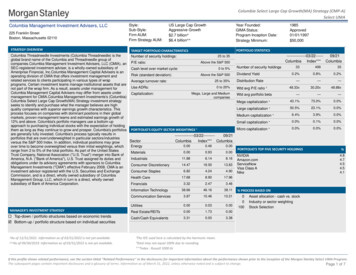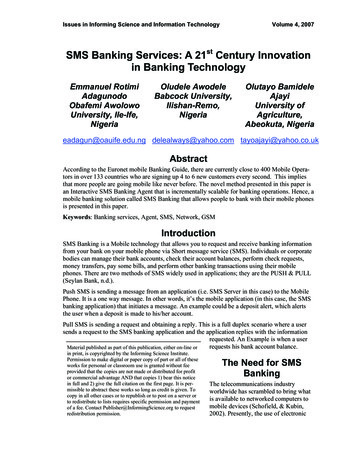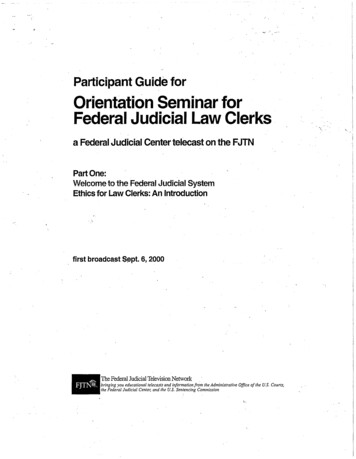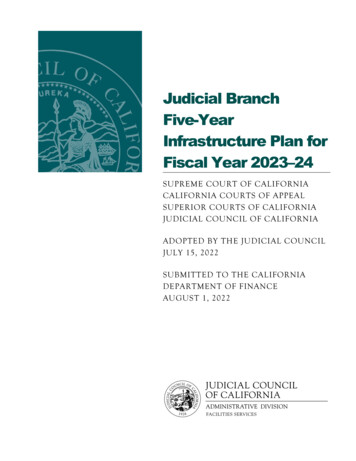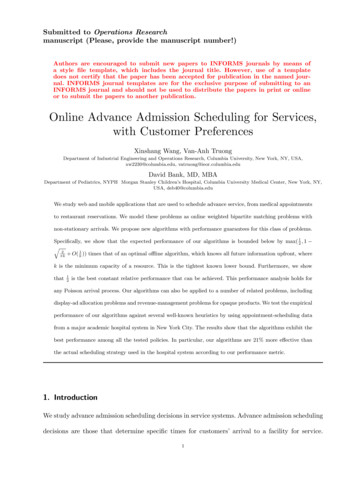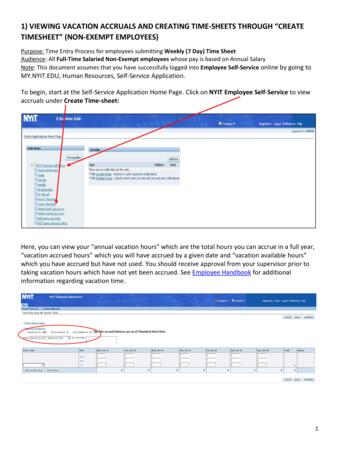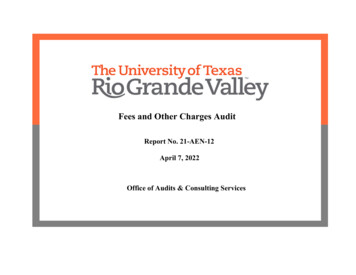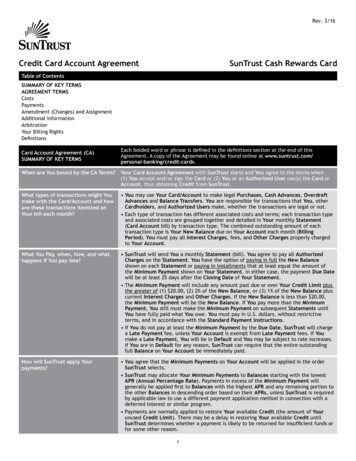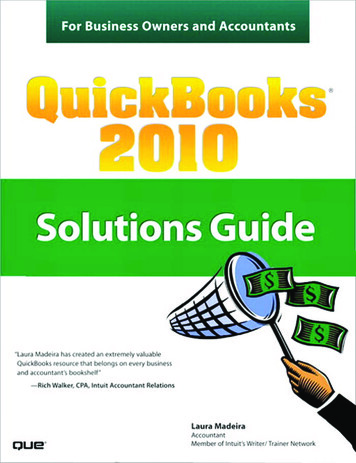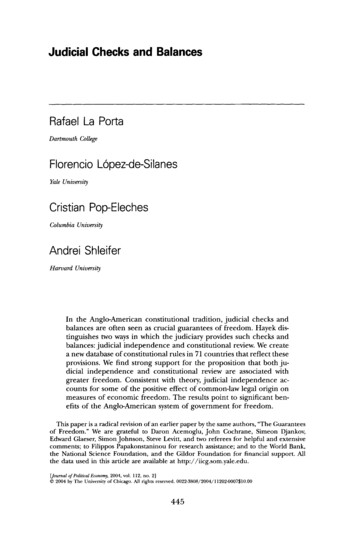
Transcription
JudicialChecksand biaUniversityAndreiShleiferHarvard UniversityIn the Anglo-American constitutional tradition, judicial checks andbalances are often seen as crucial guarantees of freedom. Hayek distinguishes two ways in which the judiciary provides such checks andbalances: judicial independence and constitutional review. We createa new database of constitutional rules in 71 countries that reflect theseprovisions. We find strong support for the proposition that both judicial independence and constitutional review are associated withgreater freedom. Consistent with theory, judicial independence accounts for some of the positive effect of common-law legal origin onmeasures of economic freedom. The results point to significant benefits of the Anglo-American system of government for freedom.This paper is a radical revision of an earlier paper by the same authors, "The Guaranteesof Freedom." We are grateful to Daron Acemoglu, John Cochrane, Simeon Djankov,Edward Glaeser, Simon Johnson, Steve Levitt, and two referees for helpful and extensivecomments; to Filippos Papakonstaninou for research assistance; and to the World Bank,the National Science Foundation, and the Gildor Foundation for financial support. Allthe data used in this article are available at http://iicg.som.yale.edu.[ournal of PoliticalEconomy,2004, vol. 112, no. 2]? 2004 by The University of Chicago. All rights reserved. 0022-3808/2004/11202-0007 10.00445
JOURNAL OF POLITICAL ECONOMY446I.IntroductionOver the centuries, societies have acquired institutions designed to guarantee the freedom of their members, defined as the absence of coercionby the government (Hayek 1960). Central among these institutions isBritannicaas the princhecks and balances, defined by the Encyclopaediawhichbranchesare empowered tounderofseparategovernmentcipleinducedto share powerbranchesandareotheractionsbyprevent The23102).importance of(http://www.search.eb.com/eb/article?euchecks and balances was recognized by early commentators on the English government (Locke 1690; Montesquieu 1748) and later influencedAmerican constitutional thinking (Madison, Hamilton, and Jay 1788).A special role in the Anglo-American thinking on checks and balancesis played by the courts (Madison, Hamilton, and Jay 1788; Hayek 1960;Buchanan 1974).' Hayek distinguishes two ways in which the judiciarycan limit the power of other branches. First, the creation of laws andthe administration of justice can be separated. Legislatures make laws,but independent judges enforce them, without interference from thelegislature or the executive. Second, lawmaking and policy making canthemselves be subject to review by courts for their compliance with theconstitution.Countries build the mechanisms of judicial independence and constitutional review into their constitutions. Some, such as the UnitedStates, assure both judicial independence and extensive constitutionalreview;other countries, such as Vietnam, allow for neither. In this paper,we assemble a new data set of constitutional provisions for judicial independence and constitutional review for 71 countries around theworld. We then ask the basic question: Are they associated with economicand political freedom? We measure economic freedom as security ofproperty rights, the lightness of government regulation, and the modestyof state ownership. We measure political freedom as democracy, politicalrights, and human rights.Theoretically, judicial independence and constitutional review workin different ways. When the executive does not control judges, they arenot as partial to his wishes. According to Alexander Hamilton, "nothingcan contribute so much to [the judiciary's] firmness and independenceas permanency in office" (FederalistPapers,no. 78). Judicial independence has obvious value for securing property and political rights whenthe government is itself a litigant, as in the takings of property by thestate. Butjudicial independence is also socially valuable in purely privateRecent research in political economy clearly recognizes the importance of checks andbalances (Laffont 2000; Persson and Tabellini 2000). This research focuses entirely onthe division of powers between the executive and the legislature and pays scarcely anyattention to the role of courts.
JUDICIAL CHECKS AND BALANCES447disputes when one of the litigants is politically connected and the executive wants the court to favor its ally. In principle, judicial independence promotes both economic and political freedom, the former byresisting the state's attempts to take property, the latter by resisting itsattempts to suppress dissent.2 In seventeenth-century England, opposition to the courts of royal prerogative, controlled by the king and usedby him both to expropriate the property of his opponents and to stoppolitical criticism through libel laws, was the crucial source of supportfor judicial independence.Besides seeking to influence judges, the executive and the legislaturewould also wish to pursue policies and pass laws that benefit themselves,democratic majorities, or allied interest groups. Constitutional reviewis intended to limit these powers. By checking laws against a rigid constitution, a court-particularly a supreme or a constitutional court-canlimit such self-serving efforts. In effect, courts rather than legislatorsbecome final arbiters of what is law. Because constitutional review isused to counter the tyranny of the majority, it may be of particularbenefit in securing political and human rights, as well as preservingdemocracy. For example, while the U.S. Supreme Court has long accepted the government's power to tax and regulate various activities, ithas been more active in protecting political rights.Historically,judicial independence and constitutional review evolvedin very different ways. Dawson (1960), Hayek (1960), and North andWeingast (1989) trace judicial independence throughout English history, including the reliance on trials by jury starting in the twelfth century, the Magna Carta in the thirteenth century, and the seventeenthcentury revolutionary fight against the courts of royal prerogative. The1701 Act of Settlement granted judges lifetime appointments as well asindependence from Parliament. The mechanisms of judicial independence were transplanted by England as part of the common-law traditioninto its colonies, including the United States. Civil-law countries havenot adopted this idea in nearly as consistent a way, and in fact judgeshave remained in most instances subordinate to the executive.Glaeser and Shleifer (2002) present a theoretical model that explainswhy judicial independence (along with jury trials) is the defining characteristic of common law. They argue that any legal system faces a basic2 Landes and Posner(1975) have a different take on judicial independence. In theirview, judicial independence prevents legislatures from undermining the laws passed bythe previous legislatures through direct power over judges and thereby raises the ex anteprice that legislators can extract from the interest groups buying legislation. It is a commitment device. We also note that judges are not intrinsically more supportive of privateproperty than the executive or the legislature, but are merely more insulated from immediate political pressures when they are independent. Along these lines, Besley andPayne (2003), looking across U.S. states, find that elected judges pursue more populistpolicies than appointed ones in the area of employment discrimination.
448JOURNALOF POLITICALECONOMYtrade-off between vulnerability of law enforcers to private subversionthrough bribery and intimidation and vulnerability to public subversionthrough executive control. Centralization of the legal system, includingsubordination of judges to the king, protects them from private subversion but makes them vulnerable to state influence. Decentralization,including judicial independence, isolates judges from the immediatewishes of the king but renders them more vulnerable to private influence. The authors argue that, in the twelfth and thirteenth centuries,England was a more peaceful and less divided country than France, andtherefore it was efficient for England to adopt a less centralized systemof law enforcement, which became the common law. France, being lesspeaceful, eschewed judicial independence.In contrast to judicial independence, the idea of limiting the lawmaking power of Parliament is foreign to the English constitution (Dicey1886). Hayek (1960) traces this idea to the eighteenth-century UnitedStates, and in particular to the creation of the Supreme Court, which,following the Marburyvs. Madison decision, came to check both lawsand executive acts against a constitution that was difficult to amend.Following the U.S. example, constitutional review gained some popularity in postcolonial Latin America and was widely adopted in WesternEurope after World War II specifically as a mechanism to secure politicalfreedom against the risks of communism and fascism (Friedrich 1968).The channels of transplantation of constitutional review are thus alsorelatively old, but very different from those of transplantation of common law.We assemble measures of judicial independence and constitutionalreview for 71 countries and assess empirically their influence on economic and political freedom. Our measures of judicial checks and balances come from national constitutions, which are significantly influenced by transplantation and do not change rapidly. In contrast, ourmeasures of freedom are the more rapidly changing "outcomes," suchas subjective assessments of freedom and patterns of government regulation. As a consequence, we think of the constitutional rules as predetermined with respect to the freedoms. We also consider the subsetof countries whose constitutions have not changed since 1980.Consistent with the hypotheses of Hayek and others, we find that bothjudicial independence and constitutional review are strong predictorsof freedom. We find that judicial independence is important for bothkinds of freedom, whereas constitutional review matters for politicalfreedom.The different channels of transplantation also enable us to examinethe micro-foundations of the empirically observed role of legal originas a predictor of a broad range of economic and regulatory outcomes.Recent research shows that, compared to countries with civil law and
JUDICIAL CHECKS AND BALANCES449socialist law, common-law countries exhibit better protection of investorrights (La Porta et al. 1997, 1998), less aggressive regulation of newentry and labor markets (Djankov, La Porta, L6pez-de-Silanes, and Shleifer 2002; Botero et al. 2003), and more generally higher scores on avariety of measures of security of property rights (La Porta et al. 1999).Quantitatively, these differences among legal origins are large. Legalorigin has proved to be a particularly useful variable for economic analysis because laws have been transplanted by relatively few colonial powers, leading to systematic variation in the legal rules. Yet despite thisevidence, the exact mechanism through which legal origin matters hasremained uncertain.Consistent with both history and theory, judicial independence isempirically strongly associated with common-law legal origin and is itselfa strong predictor of some of the same economic freedoms as commonlaw. This allows us to dig deeper into the micro-foundations of legalorigin and to ask whether its influence on economic freedoms occursin part through judicial independence.3 If the transplantation of common law brings with it independent judges and if such judges succeedin stopping excessive political intervention into the economy, then judicial independence may be one channel of common law's beneficialeffects on the security of property rights.4 In our data, judicial independence accounts for some, though not all, of the beneficial effectsof common law on economic freedom.II.DataOur analysis is based on a sample of all 71 countries covered in Maddex(1995), with the exception of transition economies (whose constitutionsare rapidly changing). We do not expand country coverage to assurethe compatibility of our coding with Maddex's but do supplement hisdata with information from actual constitutions. Table 1 summarizes thedefinitions and sources for all variables in the paper.We use four measures of economic freedom. The first is a subjectiveindex of the security of property rights against infringement by thegovernment. The second is the number of different steps that a startup business has to comply with in order to begin operating as a legalentity (Djankov, La Porta, L6pez-de-Silanes, and Shleifer 2002). Thethird measure is the intensity of regulation of the employment contracts3 Beck,Demirguc-Kunt, and Levine (2003) ask whether the measures of checks andbalances we have collected account for the beneficial effects of common law on financialdevelopment and find some empirical support for that idea.4 Of course, there are otherpotential channels, including trial by jury and, more generally, greater reliance on court-enforced private contracting in the common-law countries(Djankov, Glaeser, La Porta, L6pez-de-Silanes, and Shleifer 2003).
TABLE 1DESCRIPTION OF THE VARIABLES FOR THE 71 COUNTRIES INCLUDED IN THE STUDYVariableDescriptionDependent VariablesProperty rights indexNumber of proceduresEmployment laws indexGovernment ownership ofbanks in 1995Democracy indexPolitical rights indexHuman rights indexTenure of supreme courtjudgesA rating of property rights in each country in 1997 (on ascale from 1 to 5). The more protection private property receives, the higher the score. The score is based,broadly, on the degree of legal protection of privateproperty, the extent to which the government protectsand enforces laws that protect private property, theprobability that the government will expropriate private property, and the country's legal protection of private property. Source: Holmes, Johnson, and Kirkpatrick (1997).Measures the number of different steps that a start-uphas to comply with in order to obtain legal status, i.e.,to start operating as a legal entity. Ranges from 2 to19. Source: Djankov, La Porta, L6pez-de-Silanes, andShleifer (2002).Measures the level of worker protection through laborand employment laws. Ranges from 0.77 to 2.31.Source: Botero et al. (2003).Share of the assets of the top 10 banks in a given country owned by the government of that country in 1995.Ranges from 0 to 1. Source: La Porta,L6pez-de-Silanes, and Shleifer (2002).Democracy score for the year 1994, except for Liberia,where the latest available year (1989) was used. Rangesfrom 0 to 10, with lower values indicating a less democratic environment. Source: Jaggers and Gurr (1996).Index of political rights in 1996 (on a scale from 1 to 7).Higher ratings indicate countries that come closer tothe ideals suggested by the following checklist: (1)there are free and fair elections, (2) those electedrule, (3) there are competitive parties or other competitive political groupings, (4) the opposition has animportant role and power, and (5) the entities haveself-determination or an extremely high degree of autonomy. Source: Freedom House (1996).A measure of 37 criteria based on the rights enumeratedin the three major U.N. treaties: 1948 Universal Declaration of Human Rights, 1996 International Covenanton Civil and Political Rights, and International Covenant on Economics, Social, and Cultural Rights.Ranges from 17 to 99, with higher scores indicatingbetter human rights. Source: Humana (1992).Independent VariablesMeasures the tenure of judges in the highest court inany country. The variable takes three possible values: 2if tenure is life-long, 1 if tenure is more than six yearsbut not life-long, and 0 if tenure is less than six years.Source: Collected mainly from the constitutions ofcountries as well as secondary sources.450
TABLE 1(Continued)VariableTenure of administrativecourt judgesCase lawJudicial independenceRigidity of constitutionJudicial reviewConstitutional reviewLegal originDescriptionMeasures the tenure of the highest-ranked judges rulingon administrative cases. The variable takes three possible values: 2 if tenure is life-long, 1 if tenure is morethan six years but not life-long, and 0 if tenure is lessthan six years. Source: Collected mainly from the constitutions of countries as well as secondary sources.A dummy taking value 1 if judicial decisions in a givencountry are a source of law, 0 otherwise. Source: David(1973).Computed as the normalized sum of (1) the tenure ofsupreme court judges, (2) the tenure of administrativecourt judges, and (3) the case law variable. Source: Authors' calculations based on sources mentioned above.Measures (on a scale from 1 to 4) how hard it is tochange the constitution in a given country. One pointeach is given if the approval of the majority of the legislature, the chief of state, and a referendum is necessary in order to change the constitution. An additionalpoint is given for each of the following: if a supermajority in the legislature (more than 66 percent ofvotes) is needed, if both houses of the legislature haveto approve, if the legislature has to approve theamendment in two consecutive legislative terms, or ifthe approval of a majority of the state legislature is required. Source: Maddex (1995).Measures the extent to which judges (either supremecourt or constitutional court) have the power to reviewthe constitutionality of laws in a given country. Thevariable takes three values: 2 if there is full review ofthe constitutionality of laws, 1 if there is limited reviewof the constitutionality of laws, and 0 if there is no review of the constitutionality of laws. Source: Maddex(1995).Computed as the normalized sum of (1) the judiciary review index and (2) the rigidity of the constitution index. Source: Authors' calculations based on sourcesmentioned above.Identifies the legal origin of the company law or commercial code of each country. There are five possibleorigins: (1) English common law, (2) French commercial code, (3) German commercial code, (4) Scandinavian commercial code, and (5) socialist/communistlaws. Source: La Porta et al. (1998), extended usingReynolds and Flores (1989) and Central IntelligenceAgency (1996).451
452JOURNAL OF POLITICAL ECONOMYTABLE onLatitudeIn GDP per capitaDescriptionAverage value of five different indices of ethnolinguisticfractionalization. Ranges from 0 to 1. The five component indices are (1) index of ethnolinguistic fractionalization in 1960, which measures the probability thattwo randomly selected people from a given countrywill not belong to the same ethnolinguistic group (theindex is based on the number and size of populationgroups as distinguished by their ethnic and linguisticstatus); (2) and (3) probability of two randomly selected individuals speaking different languages; (4)percentage of the population not speaking the officiallanguage; and (5) percentage of the population notspeaking the most widely used language. Source: Easterly and Levine (1997).The absolute value of the latitude of the country, scaledto take values between 0 and 1. Source: Central Intelligence Agency (1996).Logarithm of gross domestic product per capita in U.S.dollars for 1998. Ranges from 4.5 to 10.5 in the sample. Source: United Nations (2000).(Botero et al. 2003). The fourth is an estimate of government ownershipof commercial banks as of 1995 (La Porta, L6pez-de-Silanes, and Shleifer2002). The last three measures have the advantage of being objectiverather than survey-based estimates of freedom from political interference in markets.We use three measures of political freedom, all of which are subjectiveassessments but come from different data sources. They include a democracy score, an index of political rights, and an index of humanrights.5Economic freedom and political freedom are highly positively correlated. A few countries such as Kuwait, Saudi Arabia, and Singaporescore high on economic freedom but low on political freedom. Othercountries, such as Haiti, score low on the former and high on the latter.But such countries are an exception, since economic and political freedom typically go hand in hand. Countries that score high on propertyrights also score high on democracy (.60 correlation), political rights5 The correlations among the measures of freedom within the same category are high.In the economic freedom category, countries that score high on property rights tend torequire few procedures to start a business (-.57 correlation), regulate employment lightly(-.39 correlation), and have low government ownership of banks (-.66 correlation). Inthe political freedom category, countries that score high on the index of political rightsalso score high on democracy (.91 correlation) and high on human rights (.90 correlation).Similarly, countries that score low on democracy tend to score low on human rights (.82correlation).
JUDICIAL CHECKS AND BALANCES453(.68 correlation), and human rights (.71 correlation). Similarly, countries that require a large number of procedures to set up a new businessscore low in democracy (-.25 correlation), political rights (-.33 correlation), and human rights (-.42 correlation). Political freedoms areless highly correlated with employment laws and very negatively correlated with government ownership of banks.We relate freedom to two sets of its potential determinants: judicialindependence and constitutional review. We collect de jure variablesderived from national constitutions.6 These variables reflect the relatively permanent features of a country's institutional environment, ascompared to political outcomes such as the turnover of politicians, forexample. By collecting these data, we also provide a new source ofinformation for the comparative study of institutions.We collect three proxies forjudicial independence and then combinethem into an index. In some countries, judges have life-long tenure,whereas in others they are appointed for a short period of time or evenserve at the pleasure of the president. When judges have life-long tenure,they are both less susceptible to direct political pressure and less likelyto have been selected by the government currently in office. Becausejudicial independence is particularly important for disputes between thecitizens and the state (in freedom of speech cases, contracts, etc.), wefocus on the tenure of two sets of judges: those in the highest ordinarycourts and those in administrative courts.In addition to judicial tenure, we look at case law as the third dimension of judicial independence. Because the binding power of theprecedent checks the ability of the sovereign to influence judges inspecific instances, it too serves as a useful measure of judicial independence.7 In some countries, courts merely interpret laws. In others,courts have "lawmaking"powers and judicial decisions are constrainedby prior judicial decisions. On the basis of David (1973), we keep trackof whether judicial decisions in a country are a source of law.Our measure of judicial independence is the average of our measuresof tenure of supreme courtjudges, tenure of administrative courtjudges,6Constitutional rules, like other laws, are enforced better in some countries than inothers. However, recent research points to the importance of actual legal rules in manycontexts (La Porta et al. 1998; Djankov, La Porta, L6pez-de-Silanes, and Shleifer 2002;Botero et al. 2003). Moreover, since law enforcement is strongly correlated with per capitaincome, by controlling for income we also indirectly control for the differences inenforcement.7 Even in countries in which judges are not supposed to make law de jure, they makeit de facto (Merryman 1969; Glendon, Gordon, and Osakwe 1982; Damaska 1986). Eventhese scholars, however, see the difference between countries in which precedents arebinding and countries in which only the codes are supposed to be the source of law.
454JOURNALOF POLITICALECONOMYand judicial decisions as a source of law, normalized to lie between zeroand one.8We collect data on two aspects of constitutional review. First, in somecountries the legislature derives its power and authority from the constitution and is bound by it when making laws. In other countries, thereis no hierarchy of laws to restrain the legislature, either because thereis no constitution or because the legislature can alter it in the same wayas it writes new laws. Thus a rigid constitution-one that is difficult tomodify-may constrain the power of the legislature.Second, judicial review may constrain the power of the legislature tomake laws.9In some countries, the constitutionality of laws cannot bechallenged. In others, laws are reviewed by ordinary courts (includingthe supreme court, as in the United States) or by specialized constitutional courts outside of the judicial system (as in many continentalEuropean countries). Importantly, countries also differ in the scope ofsuch review. In some countries, such as the United States, Germany,Japan, and Brazil, the institutions established to decide on the constitutionality of laws and actions enjoy the right of full review.TheJapaneseConstitution, for example, stipulates that the Supreme Court is the courtof last resort, with power to determine the constitutionality of any law,order, regulation, or official act. In other countries, the review of constitutionality is limited in the sense that it is available only to certainpersons or entities or is restricted to certain aspects of the constitution.In France, the Constitutional Council rules on the constitutionality oflaws before they are promulgated, but only the president, premier, thepresidents of the two legislative houses, or 60 members of either housecan make a request for a review. Once the law has been enacted, theConstitutional Council has no power to nullify it. Finally,countries suchas China, Finland, Iran, North Korea, or the United Kingdom have noreview at all. In North Korea, the absence of the power ofjudicial reviewby the courts is the consequence of the concentration of all power inthe leadership of the Communist party,whereas in the United Kingdom,the lack of review derives from the absolute supremacy of Parliament.Our measure of judicial review captures the extent of such review.8Excluding judicial lawmaking from the index of judicial independence reduces thestatistical significance of the results in some specifications but does not change the patternof coefficients on the judicial independence variable.9Alexander Hamilton writes (FederalistPapers,no. 78) that "the complete independenceof the courts of justice is peculiarly essential in a limited constitution. By a limited constitution, I understand one, which contains certain specified exceptions to the legislativeauthority; such, for instance, as that it shall pass no bills of attainder, no ex post factolaws, and the like. Limitations of this kind can be preserved in practice no other way thanthrough the medium of the courts of justice; whose duty it must be to declare all actscontrary to the manifest tenor of the constitution void. Without this, all the reservationsof particular rights or privileges would amount to nothing."
JUDICIAL CHECKS AND BALANCES455The index of constitutional review is the average of our measures ofthe rigidity of the constitution and judicial review, normalized to liebetween zero and one.10Following our earlier research, we also use data on the origin of acountry's commercial laws. They include common law (England and itscolonies), French civil law (France, countries conquered by Napoleon,and their colonies), German civil law (Germany, Switzerland, Austria,Japan, South Korea, and Taiwan), socialist law (Cuba, China, Vietnam,and North Korea), and Scandinavian law.The correlations among our measures of judicial independence, constitutional review, and legal origin are presented in table 2. The threemeasures ofjudicial independence are highly correlated with each other,as are the two measures of constitutional review. The two indices, however, have a statistically insignificant correlation of only .22 (althoughthe correlation between judicial independence and judicial review is astatistically significant .31). The data also show that judicial independence, but not constitutional review, is particularly high in commonlaw countries. Both measures of checks and balances are low in socialistcountries. We also find no evidence that either judicial independenceor constitutional review is higher in richer countries.1 These data showthat the two kinds of checks and balances do indeed reflect differentaspects of the data and are not just raw measures of institutionalgoodness.III.ResultsIn this section, we examine the constitutional determinants of economicand political freedom. In presenting the results, we (1) always use eachof the seven measures of freedom summarized above, (2) use the indicesofjudicial independence and constitutional review, and (3) first presentthe results with no controls and then those with additional controls forthe possible determinants of freedom. We use three controls. Followingour earlier work (La Porta et al. 1999), we include both latitude andethnolinguistic fractionalization. We include latitude because temperatezones have healthier climates, which might have contributed to bothbetter institutions and better outcomes (Engerman and Sokoloff 1997).We include ethnolinguistic fractionalization because both the available"0With respect to the index of constitutional review, we have also considered alternativedefinitions. First,judicial review may matter only if the constitution is rigid, and hence aproper in
dicial independence and constitutional review are associated with greater freedom. Consistent with theory, judicial independence ac- counts for some of the positive effect of common-law legal origin on measures of economic freedom. The results point to significant ben- efits of the Anglo-American system of government for freedom.
